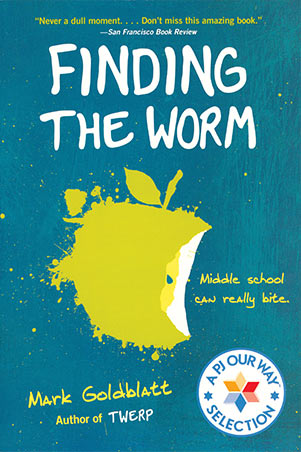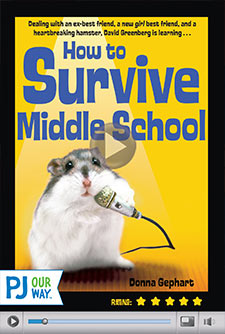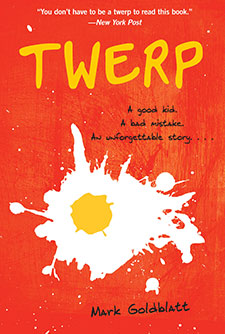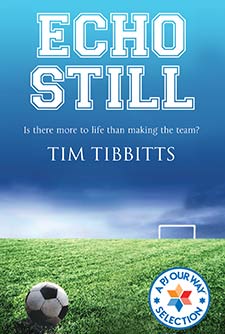Finding the Worm
Quentin’s sick, and the Ponzini gang doesn’t feel the same as it used to. But Julian’s still running... and Beverly’s still chasing him. Will they ever race? If you liked Twerp, you'll love this standalone sequel!
Average Rating
( hint: Login to leave a review! )
40 Reviews
Leave Review
What the Book Is About
Jewish Content & Values
Positive Role Models
Content Advisory
Talk It Over!
More for You
What the Book Is About
In this sequel to Twerp, Julian, Lonnie, Quentin, Shlomo, Howie, and Eric the Red are in middle school, and their friendship is stronger than ever. Then Quentin is diagnosed with a brain tumor, Julian is falsely accused of defacing a painting, and Julian's friend Beverly keeps challenging him to race her. Finding the Worm captures the friendship between a group of preteen boys in a story filled with humor, tragedy, moral dilemmas, and loads of heart. It has some tear-jerking moments, but it is a wonderful choice for mature middle-grade readers. This book is based in part on the author’s own childhood.
Jewish Content & Values
- Julian and his friends are all Jewish. Lonnie’s mother was in a concentration camp, and this is mentioned briefly. Shlomo’s father is religious, and his family observes Shabbat (sabbath). All the boys are in their bar mitzvah year.
- The boys bring money for the tzedakah (charity) box when they go to synagogue.
- Julian has many conversations with his rabbi during the course of his bar mitzvah preparations; they speak about heaven, God, and death. The conversations help Julian feel more connected to his Judaism when Quentin's illness causes him to doubt his faith.
Positive Role Models
- Julian sticks to his principles and refuses to own up to vandalizing a painting when he isn’t guilty. He postpones his bar mitzvah when Quentin is ill and matures over the course of the novel. By the time of the ceremony he is a true mensch.
- Beverly is brave and compassionate. When Quentin comes home in a wheelchair looking very ill, the boys feel awkward and keep their distance. Beverly, however, approaches Quentin and gives him a kiss on the cheek, which breaks the ice; she then leaves the boys to talk privately. Later, when a bully is being cruel about Quentin, she prevents a fight between Devlin and Quentin’s gang by using words to make Devlin back down and leave.
- Quentin is a kind-hearted and generous boy. When his father gives him $20, (a lot of money for a child in 1970), Quentin puts half of it in the tzedakah box. When he has the chance to get a signed photo of his favorite baseball player, he says he is a fan of Julian’s favorite player instead, as a way of thanking Julian for postponing his bar mitzvah.
- Rabbi Salzberg teaches Julian his bar mitzvah portion and helps him relate it to the events happening in Julian’s life. The rabbi encourages Julian to consider big questions such as why bad things happen to good people.
- Julian, Lonnie, Shlomo, Howie, and Eric the Red are loyal and kind friends to Quentin. At school, they carry Quentin's wheelchair on and off the bus and up and down the stairs. When Quentin is desperate to play tag but can no longer run, Lonnie invents piggyback tag and carries Quentin on his back.
Content Advisory
When comparing Christmas and Hanukkah, Julian says he would rather get eight “crappy” presents than one large Christmas present. Julian and Beverly realize they are “sweet on each other,” and, while there is some kissing, their budding romance is handled in a realistic and age-appropriate way, and the relationship is based on friendship and respect. Quentin dies near the end of the book and this is, of course, extremely sad, though the author describes Julian and his friends’ responses in a way that is very sensitive and even cathartic.
Talk It Over!
Rabbi Salzberg asks Julian if he would want to live in a world in which only good things happened to good people and only bad things happened to bad people. At first Julian says he would, but later he changes his mind. What do you think, and why?
More for You
The boys in Finding the Worm love baseball. American Jews’ love of baseball is so well established that, in 2004, the National Baseball Hall of Fame held an exhibition called "A Celebration of Jews in Baseball.” In 2010, Peter Miller directed the movie Jews and Baseball: An American Love Story, and in 2014, the National Jewish Museum in Philadelphia hosted an exhibition called “Chasing Dreams: Baseball and Becoming American.” There have been famous Jewish baseball players throughout history, including Hank Greenberg and Sandy Koufax, role models not only because they were top players but because they both refused to play on Yom Kippur. Of the eight Jewish MLB players in 2018, Alex Bregman, Kevin Pillar, Danny Valencia, and Zach Weiss all had a bar mitzvah, while Joc Pederson played for Israel in the 2012 World Baseball Classic.
What the Book Is About
What the Book Is About
In this sequel to Twerp, Julian, Lonnie, Quentin, Shlomo, Howie, and Eric the Red are in middle school, and their friendship is stronger than ever. Then Quentin is diagnosed with a brain tumor, Julian is falsely accused of defacing a painting, and Julian's friend Beverly keeps challenging him to race her. Finding the Worm captures the friendship between a group of preteen boys in a story filled with humor, tragedy, moral dilemmas, and loads of heart. It has some tear-jerking moments, but it is a wonderful choice for mature middle-grade readers. This book is based in part on the author’s own childhood.
Jewish Content & Values
Jewish Content & Values
- Julian and his friends are all Jewish. Lonnie’s mother was in a concentration camp, and this is mentioned briefly. Shlomo’s father is religious, and his family observes Shabbat (sabbath). All the boys are in their bar mitzvah year.
- The boys bring money for the tzedakah (charity) box when they go to synagogue.
- Julian has many conversations with his rabbi during the course of his bar mitzvah preparations; they speak about heaven, God, and death. The conversations help Julian feel more connected to his Judaism when Quentin's illness causes him to doubt his faith.
Positive Role Models
Positive Role Models
- Julian sticks to his principles and refuses to own up to vandalizing a painting when he isn’t guilty. He postpones his bar mitzvah when Quentin is ill and matures over the course of the novel. By the time of the ceremony he is a true mensch.
- Beverly is brave and compassionate. When Quentin comes home in a wheelchair looking very ill, the boys feel awkward and keep their distance. Beverly, however, approaches Quentin and gives him a kiss on the cheek, which breaks the ice; she then leaves the boys to talk privately. Later, when a bully is being cruel about Quentin, she prevents a fight between Devlin and Quentin’s gang by using words to make Devlin back down and leave.
- Quentin is a kind-hearted and generous boy. When his father gives him $20, (a lot of money for a child in 1970), Quentin puts half of it in the tzedakah box. When he has the chance to get a signed photo of his favorite baseball player, he says he is a fan of Julian’s favorite player instead, as a way of thanking Julian for postponing his bar mitzvah.
- Rabbi Salzberg teaches Julian his bar mitzvah portion and helps him relate it to the events happening in Julian’s life. The rabbi encourages Julian to consider big questions such as why bad things happen to good people.
- Julian, Lonnie, Shlomo, Howie, and Eric the Red are loyal and kind friends to Quentin. At school, they carry Quentin's wheelchair on and off the bus and up and down the stairs. When Quentin is desperate to play tag but can no longer run, Lonnie invents piggyback tag and carries Quentin on his back.
Content Advisory
Content Advisory
When comparing Christmas and Hanukkah, Julian says he would rather get eight “crappy” presents than one large Christmas present. Julian and Beverly realize they are “sweet on each other,” and, while there is some kissing, their budding romance is handled in a realistic and age-appropriate way, and the relationship is based on friendship and respect. Quentin dies near the end of the book and this is, of course, extremely sad, though the author describes Julian and his friends’ responses in a way that is very sensitive and even cathartic.
Talk It Over!
Talk It Over!
Rabbi Salzberg asks Julian if he would want to live in a world in which only good things happened to good people and only bad things happened to bad people. At first Julian says he would, but later he changes his mind. What do you think, and why?
More for You
More for You
The boys in Finding the Worm love baseball. American Jews’ love of baseball is so well established that, in 2004, the National Baseball Hall of Fame held an exhibition called "A Celebration of Jews in Baseball.” In 2010, Peter Miller directed the movie Jews and Baseball: An American Love Story, and in 2014, the National Jewish Museum in Philadelphia hosted an exhibition called “Chasing Dreams: Baseball and Becoming American.” There have been famous Jewish baseball players throughout history, including Hank Greenberg and Sandy Koufax, role models not only because they were top players but because they both refused to play on Yom Kippur. Of the eight Jewish MLB players in 2018, Alex Bregman, Kevin Pillar, Danny Valencia, and Zach Weiss all had a bar mitzvah, while Joc Pederson played for Israel in the 2012 World Baseball Classic.




